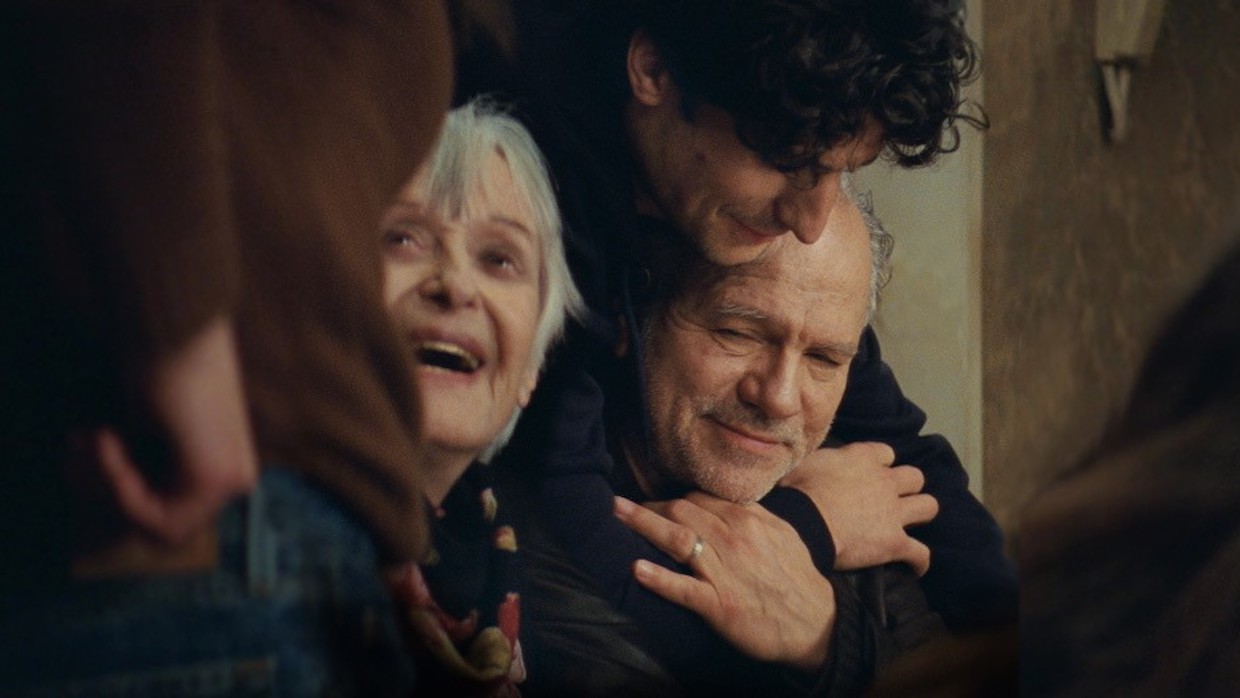 Back to selection
Back to selection
Berlinale 2023: The Plough
 Francine Bergé, Louis Garrel and Aurélien Recoing in The Plough
Francine Bergé, Louis Garrel and Aurélien Recoing in The Plough A tiny visual suture at the very beginning of Philippe Garrel’s The Plough inadvertently attests to two different formats being stitched together. The letters of the production company/financing body credits have slightly serrated edges against a dark grey background and clearly come from a digital file, while the subsequent dedication and title card have smooth-lined lettering against a perceptibly darker black, with a few scratches further confirming their celluloid origin. Somebody output those titles to 35mm, then scanned them back in, which speaks to differing deliverables standards for different parts of the chain, as well as to Garrel’s loyalty to the medium (he’s said that if he can’t shoot film, he’ll quit making movies altogether) and metaphorically to the filmmaker’s almost anachronistic work, both technologically and thematically in generating decades of features from the presumably infinite fascinations of infidelity and its repercussions.
The story trends along familiar lines (adultery, artmaking and the poverty that goes with it), again building on Garrel’s family history. His long-gone father Maurice, formerly a regular screen presence, was at one point a puppeteer; in this film, his stand-in is Aurélien Recoing as the paterfamilias of a puppet troupe. That actor’s father, Alain, was Philippe’s godfather and a member of the same troupe as Maurice, while the children are played by Garrel’s own. In the press kit, the director writes that “I wanted to make a film with my three children […] I realize that depicting one’s family is a pleasure usually reserved for painters. Since my children are aged 22, 30 and 38, I had to find a reason to bring them together at those ages.” (Whether related to Garrel or not, the young women look so similar that I was repeatedly confused about who was sleeping with whom, and I wasn’t the only one.)
The Plough is Garrel’s first feature in color since 2011’s A Burning Hot Summer, which drew my heightened attention to elements—especially lens flares and the curved frame edges produced by anamorphic lenses—I’ve grown used to in his black-and-white work; seeing them in color is like seeing them entirely anew. Likewise, some of the big attractions of Garrel’s films are the impossibly naturalistic performances he obtains, so one of The Plough‘s fascinations are the puppet plays and the novelty of the performances they generate. The dialogue reminded me that there is a meaningful difference between two terms often used as synonyms, the broader category of puppets (manipulated from within by a hand) and their sub-class of marionettes (manipulated by strings from above); depicting the former produces substantially more movement. Garrel mostly shoots from the performer side of the proscenium so we can see the troupe’s members scurry around each other, manipulating the puppets while peripherally clocking each other and contorting their faces to produce comic voices. As seen on the other side, the result of their seamless naturalism is absolute artifice, which can serve as a metaphor for Garrel’s own methods. Those uncannily convincing performances, the result of months of rehearsal and other invisible labors, generate a low-key tension juxtaposed against the larger artifices containing them. In this case, visible narrative manipulations include explicit dialogue foreshadowing, invoking Hamlet both by allusion and explicitly and the deliberately semi-artificial quality of two thunderstorm sequences, all flashing lights cued off-screen and meticulously sculpted claps of thunder.
There’s a familiar emphasis on left political life in France, both in the 20th century as retold by the family’s grandmother and now, as embodied by the young daughters’ involvement in demonstrations (described, not seen) led by Femen and others. An interest in liberal politics is one of the only continuities within Garrel’s work that may be confidently expected to outlast his lifetime, and he says he conceives of the craft of puppetry as a “metaphor of a world where traditions are dying.” This sense of a way of things fading, most specifically Garrel’s mode of filmmaking, is pervasive and not hard to pick up on in a narrative that includes two funerals (one of the co-writers, Jean-Claude Carriere, died in the time between scripting and premiere). In a scene where the father invites the only non-family performer to take over the troupe, film whirring through the camera is clearly audible in the background, as it is in a few other scenes. The on-screen passing of the torch is as anachronistic a gesture as the way it’s shot. All things must pass; some I’ll miss more than others.
